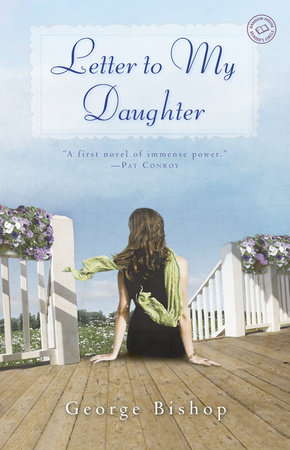Letter to My Daughter Reader’s Guide
By George Bishop


1. Mother-daughter relationships are the crux of this novel. How are these often complicated relationships portrayed? What differences, if any, do you see between the different generations, i.e., between Laura and her mother and between Liz and Laura? Do these portrayals reflect your own relationship with your mother? How?
2. Liz’s side of the story is never presented in the novel. What impressions of her do you get from Laura’s letter? Do you think Liz and Laura have a relationship similar to Laura’s relationship with her own mother?
3. Laura writes this letter to Liz in hopes of breaking the cycle of distrust and miscommunication that she experienced
with her own mother. Do you think that this letter will have the effect that Laura would like it to? Do you think that writing this letter makes Laura more sympathetic to her own mother? Do you think that writing this letter was the right thing for Laura to do after her daughter ran away?
4. Laura waits until Liz is fifteen to tell her the truth about her own teenage years. Do you think it would have made a
difference if she had shared her story with Liz earlier? What do you think Liz’s reaction to it will be?
5. Laura knows, even before their disastrous meeting, that her parents disapprove of her dating Tim. How do you think
this affected her attraction to him and her devotion to their relationship?
6. Do you think Laura’s parents did the right thing by sending her away to school? What do you think their motivations
were when they made the decision to send her away? Ultimately, did Laura’s experience at Sacred Heart make her a more or a less dutiful daughter?
7. When Tim tells Laura that he has enlisted in the army, he claims he’s doing it for her. Do you think he and Laura both truly believe this at the time? Should Laura have asked him not to go, as her older self thinks she should have?
8. Laura makes a scrapbook for Tim of everything she has been doing while they’ve been apart because she wants to
share everything with him. She says, “If you had to choose the moments that best represented your life, what would
they be? The small actions that pass almost without our noticing them, yet that we spend most of our time doing;
aren’t these in fact the real stuff of our lives?” (p. 56) Do you agree with Laura? How would you answer her question?
9. Sister Mary Margaret tries to help Laura and ensures that she receives Tim’s letters. Why do you think she puts
her own job in jeopardy to help Laura? Do you think her transfer to another school was appropriate?
10. Laura refers to herself and her group of friends at Sacred Heart as the “charity cases.” Do you think Laura’s status remained this way throughout her high school years, especially after she found her niche on the newspaper staff? To what extent is this experience universal for high school students?
11. Laura starts to feel disconnected from Tim after not seeing him for a very long time and as she becomes more involved in life at Sacred Heart. And later, she stops reading Tim’s letters, as they become more depressing and pessimistic. She says, “I couldn’t take on the burden of being his lifesaver, too, his one and only hope” (p. 115). How did you feel about Laura’s behavior toward Tim? Did your view of her character change? Why or why not?
12. In his final letter to Laura, Tim wonders whether or not she is in agreement with his dream of what their future would be like, and says that, regardless, the thought of her helped him get through each day and be “a little bit kinder or a little bit braver” (p. 124). Do you think Tim thought Laura would still be waiting for him when he returned? How important are beliefs like this, even if false, during times of extreme duress?
13. Laura and Tim are young when they first meet, and over the course of their courtship both of them grow and mature in different ways. Do you think this is an accurate representation of first love?
14. Laura agreed to go the senior prom with Chip, the fellow journalist that had been pursuing her despite her relationship with Tim. Laura is unfaithful to Tim with Chip, and Chip eventually stops talking to Laura after this. Laura doesn’t blame Chip for his reaction, and is very hard on herself for her behavior. Do you agree with Laura’s take on the situation? How do you think Liz will react to hearing this story about her mother’s past?
15. Laura sees her decision to get a tattoo in memory of Tim as an inspired moment. “It was as if the act had been there all along, in my mind and in my body, only waiting for this moment to be realized” (p. 126). Do you think this was
an appropriate way to honor Tim? What do you think Laura’s decision to get a tattoo of lines from an Elizabeth Barrett Browning sonnet and to name her daughter after this poet really represents to Laura?
16. Laura refers to Liz’s father as she frets about Liz’s disappearance, and describes to Liz what he is doing while they are waiting for her to come home. As you were reading, did you think that Liz’s father would be either Tim or Chip? Who do you imagine Laura ended up marrying?
17. In the last scene of the novel, Laura is finishing her letter to Liz when she hears a car approaching. Do you think
this is Liz coming home? Why or why not?
Just for joining you’ll get personalized recommendations on your dashboard daily and features only for members.
Find Out More Join Now Sign In